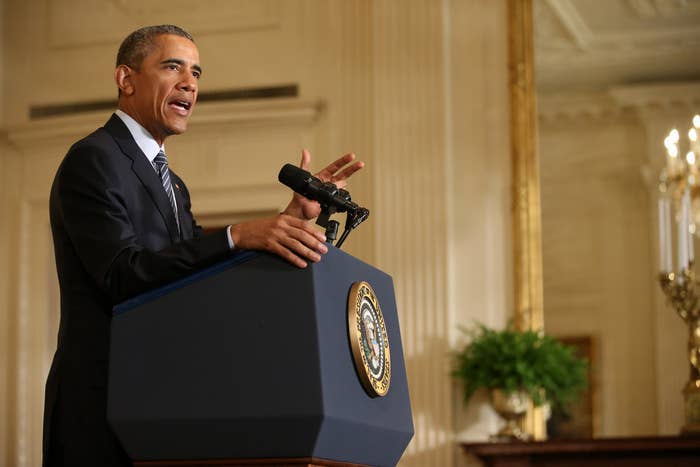
Highlighting what he said was the moral and environmental imperative to fight climate change, President Barack Obama on Monday detailed plans to cut emissions from coal power plants in a bid to reduce carbon emissions.
Speaking at a press conference in the White House, which had to be moved inside due to the August heat, the president called his plan to impose federal limits on the amount of carbon power plants can produce "the single most important step America has ever taken in the fight against climate change."
"We're the first generation to feel the impact of climate change and the last generation that can do something about it," Obama said. "We only get one home. We only get one planet. There's no plan B."
According to the White House, the plan would reduce carbon emissions by 32% from levels seen a decade ago -- the equivalent of cutting electricity from 108 million U.S. homes, or taking 166 million cars off the roads.
The U.S. Environmental Protection Agency (EPA) calls the strategy the "first-ever national standards that address carbon pollution from power plants."
In a video posted to Facebook on Sunday, Obama called the new plan "the biggest, most important step we've ever taken to combat climate change."
The new proposed rules are largely modeled after the original draft version of the president's energy plan -- meaning that they will still hold states accountable for achieving their own individual goals for reducing carbon pollution. Some states will also have the option of designing their own plans to curb pollution.
The Obama administration largely expects this to be done by using a "cap and trade" policy, in which states place a limit on carbon pollution and must purchase permits to exceed it.
States that use the cap and trade system will be rewarded with "financial benefits," and those that achieve their goals of decreasing carbon use can trade in their permits for cash.
The EPA said the new rules under the Clean Power Plan will provide "national consistency, accountability, and a level playing field, while reflecting each state's energy mix."
Opponents of Obama's proposed revision have already voiced their plans to fight the measures, calling them a "war on coal."
On June 25, Kentucky Sen. and Republican Majority Leader Mitch McConnell formalized his opposition, alleging that the White House and the EPA have "waged a war against Kentucky coal jobs, miners, and their families."
Complying with the Clean Power Plan, McConnell added, "would mean closing power plants, cutting more jobs, and increasing the cost of electricity for families and job creators across the state."
Obama directly challenged these arguments during his address on Monday: The critics, he said, would "claim this plan is a war on coal to scare off votes, even as they ignore my plan to actually invest in revitalizing coal country and supporting health care and retirement for coal workers and their families, and retraining those workers for better paying jobs and healthier jobs."
The president also countered the notion that climate change policies toward clean energy would put minority and lower-income communities at a disadvantage "even though climate change hurts those Americans the most, who are the most vulnerable."
"If you care so much about low-income and minority communities, then start protecting the air they breathe" —@POTUS to the GOP in Congress
An EPA representative argued that apart from drastically cutting the pollution that exacerbates climate change, the Clean Power Plan will protect families' health, give states individual authority on how they will meet their energy goals, and save Americans billions of dollars each year.

